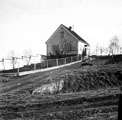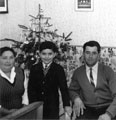When Gisela Sarközi came back to Unterschützen after the liberation, the Roma settlement had been destroyed. Her cousins told her that her parents and five siblings had been deported to Auschwitz in 1942. They had been murdered there. Gisela Sarközi married in the beginning of the 1950s. Her husband had survived the Mauthausen concentration camp. She shared a house with one room and a kitchen with him and her two oldest children, as well as with 13 other people. This house had been put at their disposal by the local authorities. Using their compensation payments, she and her husband later built their own house. Gisela Sarközi was not invited to class reunions, because one of her former classmates did not want to be photographed with the "gypsies". The family changed the name from Sarközi to Samer in 1970, because with the former name it was impossible to find traineeship positions for the children. Gisela Samer's children in time all moved to Vienna, to escape from their stigmatization as "gypsies". Gisela Samer still lives in her house in Burgenland. She would like to find a rest home where there are other "concentration campers", in order to spend the rest of her life amongst human beings.
Sadly, this wish was not granted any more. Gisela Sarközi-Samer died on December 29th, 1999.
"What has been shall not happen again. (…) What we have been through, nobody can believe it. Whoever has not been through it themselves, (…) you cannot have stood that! That can't be possible! But it was possible, and we had to stand it. And we had to do it, whoever didn't do it, they got a bullet, and were gone."
"The children had finished school, and I wanted each of them to learn something (…) We went in in front (at the plumber's), and they sent us out through the back door, because his name is Sarközi. So I told my husband, you know, tomorrow you'll go to the municipal office and see to it that we get another name."
Roma in Burgenland after 1945
Before 1938, 8,000 Roma lived in Burgenland. After 1945 there were about 2,000 left. These losses represent a massive break in the Roma community. A lot of their culture, which is mostly transferred orally, was lost. Today, most Roma live in the south of Burgenland, in ghetto-like settlements outside the villages. Their position as outsiders has hardly changed. Prejudice and rejection are part of their daily lives. It was as late as 1993 before they were recognized as a minority in Austria.







